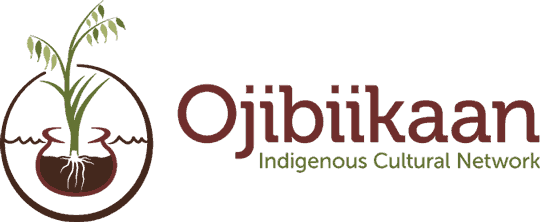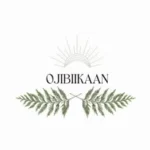about us
Our Mission & Values
Ojibiikaan was founded in 2018 to address gaps in Toronto related to Indigenous food sovereignty, such as food and nutrition education, sustainable food systems and practices, and traditional ecological knowledge. Ojibiikaan provides opportunities to engage with the land across the City to Toronto and the outer city. We connect with the land through activities like medicine walks, snowshoeing, sugarbush tapping, gardening and traditional cooking. Our programming is always centred on ceremony, offerings, songs and storytelling. We take a holistic approach that centres and honors the land, have knowledge of protocols, ceremonies and ways of relating to the land and are an entirely Indigenous team that has understanding of the historical, cultural and social significance to the land.
We value community, culture, sustainability, transparency, respect, youth empowerment, intergenerational learning, food sovereignty, and seven generations teachings.
About The Indigenous
Food Sovereignty Movement
The term food sovereignty was coined in 1996 by the members of the Via Campesina (peasants) movement, started in Central and South America. The movement was sparked from the need for farmers and growers producing the food to have control and voice in regards to policy making within the food system.
The movement strongly focused on the right of people to have access to foods that are culturally appropriate, and that are produced in a ethical and sustainable way. The most important aspect of the food sovereignty movement is that everyone has a right to define their own food and agriculture systems.
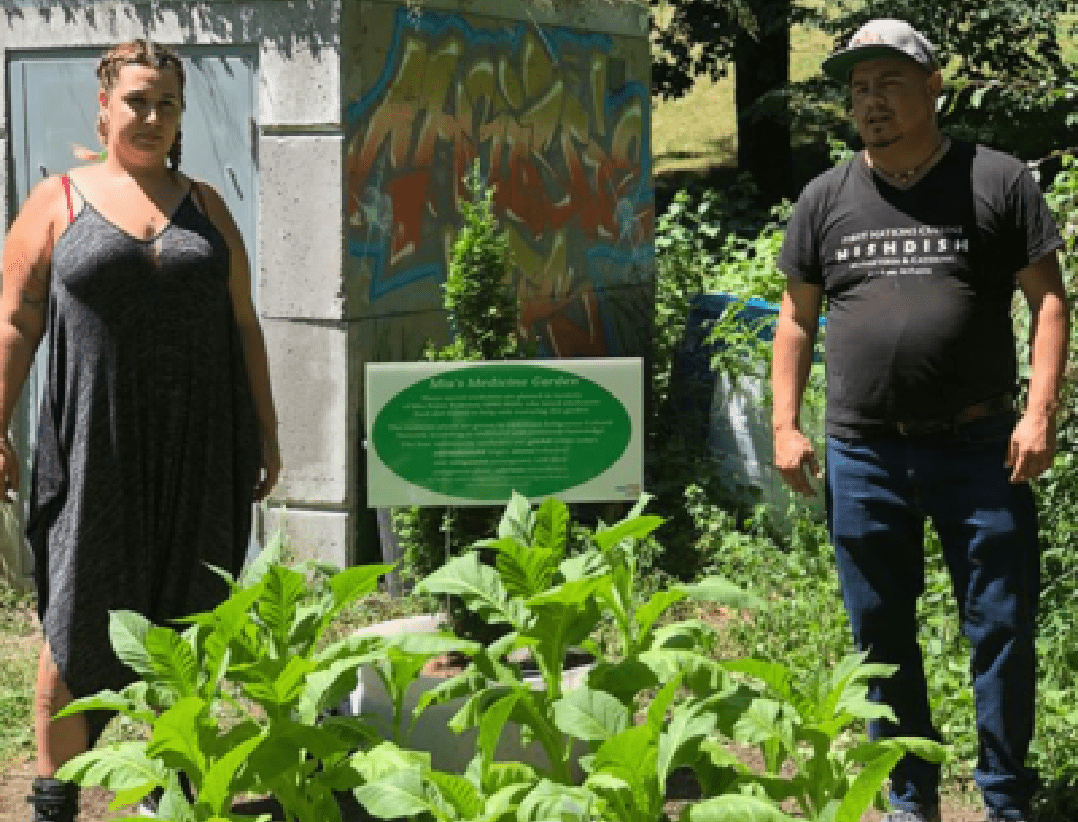
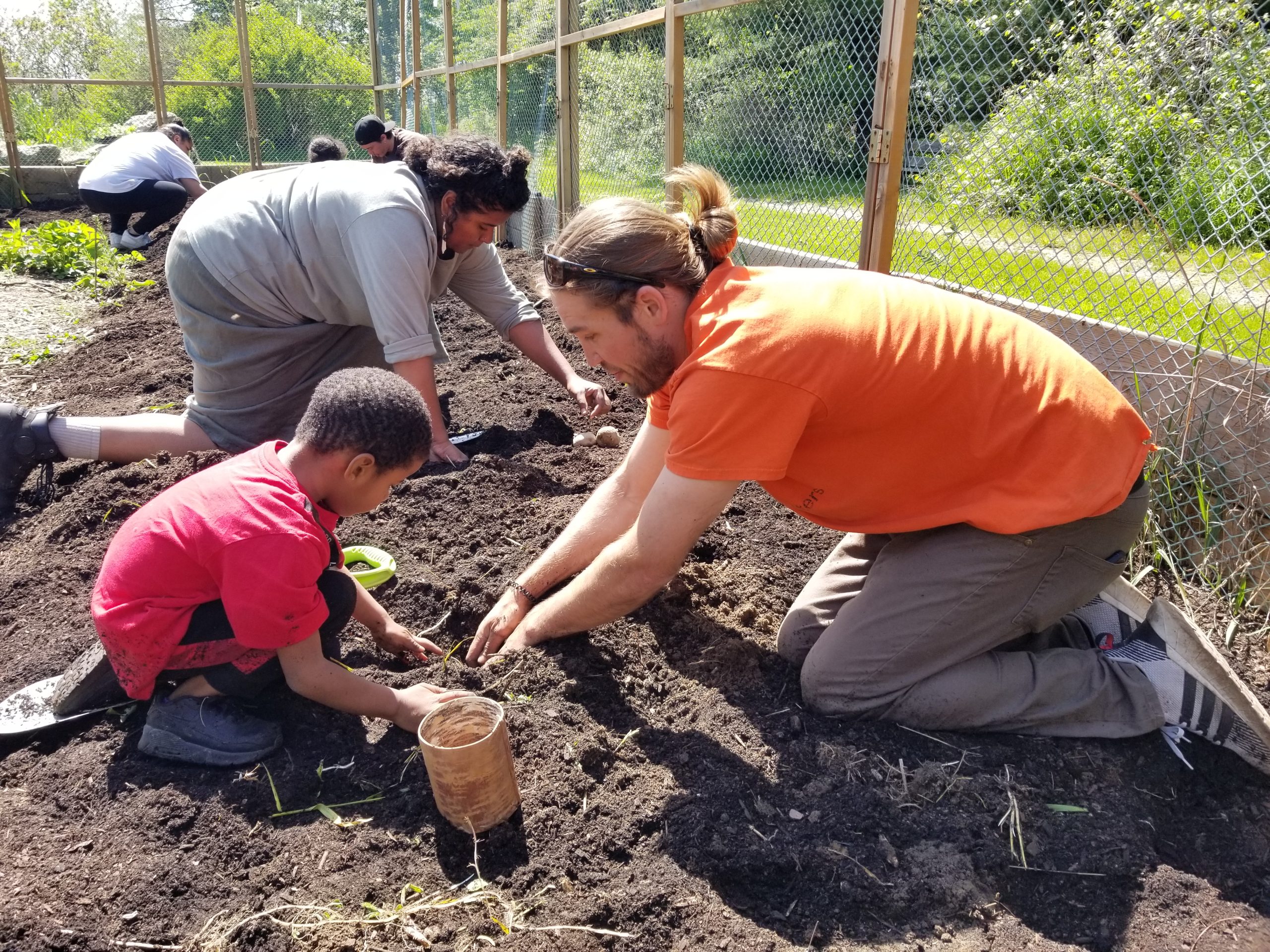
The ideas and values of the food sovereignty movement quickly spread across Turtle Island, gaining a strong momentum in the United States and moving to Canada shortly after. Indigenous food sovereignty is about our communities having access to our land, ceremony and traditional foods that nourish our heart, mind and body. The relationship with land and our foods is sacred. We have a responsibility, as individuals and communities, to honor and nurture our relationships with the land, plants and animals that provide us our food.
Indigenous Food Sovereignty In Toronto
Ojibiikaan provides tools and resources needed to grow and harvest our traditional foods in an urban setting in the City of Toronto. Our gardens are centered on traditional growing and harvesting techniques rooted in ceremony, storytelling and thanking mother earth for the space she provides to us to grow and learn together.
Our approach to gardening is to first understand the space in which we will start gardening. Listening to and knowing the space involves observing the critters and animals, lighting patterns, looking at the soil structure and getting to know the water. We make sure that when planning the garden space that we look at accessibility and how people would access the space. We provide a space the allows our participants to create a relationship with the growing space that is self-determining.
Indigenous food sovereignty supports our reconnection to our relationship with the land. We can grow own food and contribute to the revitalizing of Indigenous growing in a urban setting.
Ojibiikaan
Staff & Board of Directors

Laura Suthers
Program Manager
From M’Chigeeng First Nation on Manitoulin Island, Laura attributes most of her cultural and traditional knowledge gained at a young age from working alongside Elders, knowledge keepers, artists, and other youth.
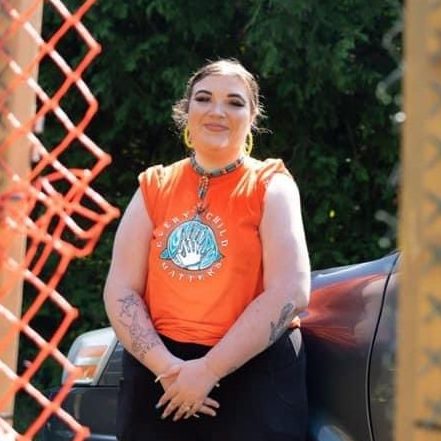
Cheyenne Sooley
Communications Facilitator
My name is Cheyenne Sooley (she/her), I’m Ojibwe from Beausoleil First Nation. I’m the communications facilitator at Ojibiikaan and I help manage our social media pages! I have my SSW from Durham College and my B.A in Psychology from Carleton University. I’m passionate about Indigenous outreach and ensuring that there are accessible programs available for the community, as well as a spot for youth to connect with culture and the community in an engaging way. I am proud and excited to be a part of this team, and learn more cultural teachings along the way.
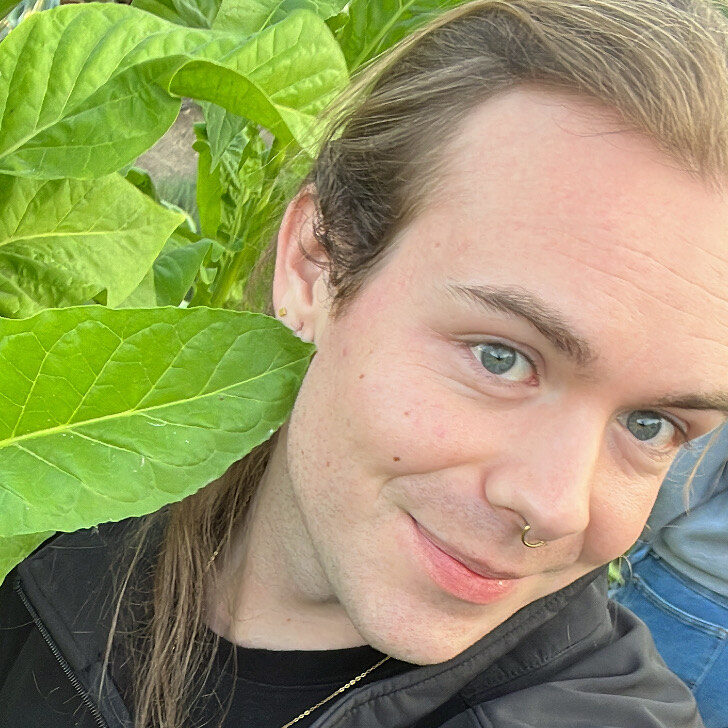
ETHAN DANKERT-LANNIGAN
Cultural Team Lead
Ethan Dankert-Lannigan’s (they/he) family is from Big River, Saskatchewan with a lineage tied to Duck Lake, Batoche and the Red River Metis Nation. They were raised in Guelph, ON and later moved to Toronto In 2017.

CHRIS MERKEL
Mobile Cultural Coordinator
Chris Merkel is from the Tahltan Nation of northern British Columbia through his father’s mother’s family line. Chris grew up in Port Sydney, ON (about 2 hours north of Toronto).
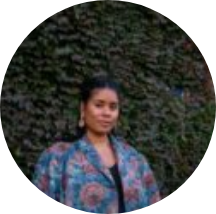
CHEYANNE VALENCIA-HINDS
Mobile Cultural Coordinator
Cheyanne Valencia-Hinds is Cree from the Attawapiskat First Nation. She is of the Bear Clan. She was born and raised in Mississauga, Ontario.

CHEF JOHL WHITEDUCK RINGUETTE
Board President
Chef Johl Whiteduck Ringuette is Anishnawbe and Algonquin. He was born in North Bay, Ontario and his grandmother is from Nippissing First Nations. His clan is Mink clan.
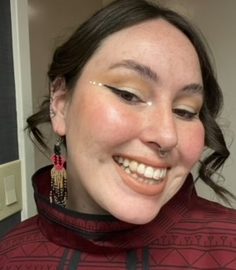
Paige Kreps
Board Member
Paige Kimiksana Kreps (she/they) is mixed Inuvialuk and white from Tuktoyaktuk/Inuvik. Raised near Toronto, Paige is deeply involved in the Toronto Inuit and Indigenous community through work and volunteering.

Charlotte Big Canoe
Board Member
Charlotte Big Canoe is the Program Curator for Indigenous Projects at the Art Gallery of Ontario. Her father’s family is from the Chippewas of Georgina Island First Nation, in Sutton Ontario, and her mother’s family is Irish settler. Charlotte is passionate about creating spaces for Indigenous youth to feel they belong as their full selves, and providing opportunities for youth to connect with positive role models. Charlotte currently lives in Tkaronto, on treaty 13 territory.
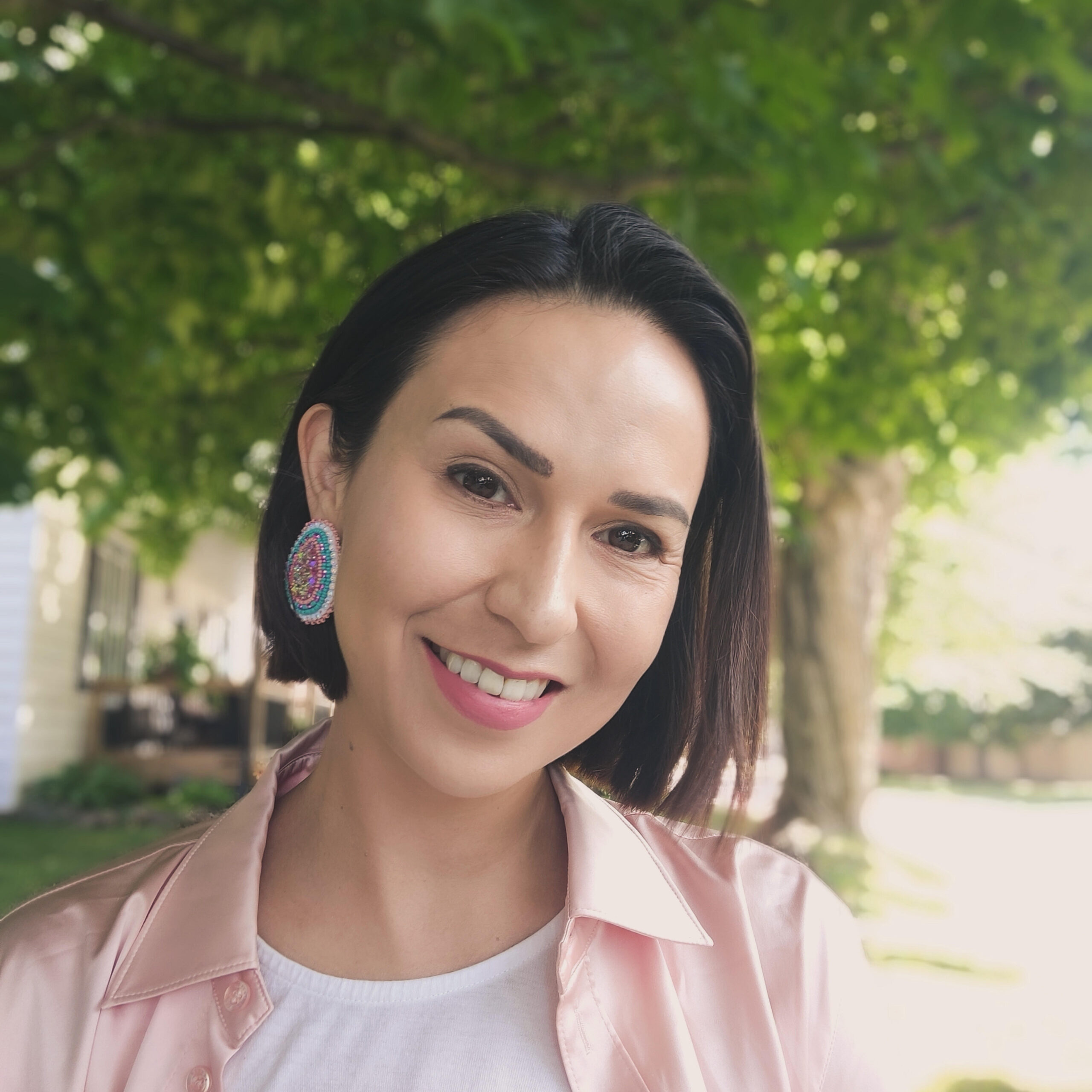
Sarah Chegahno
Board Member
Sarah is the Housing Manager for Chippewas of Nawash Unceded First Nation. She is a dedicated Anishinaabek First Nation professional specializing in community consultation and engagement, with deep roots in Neyaashiinigmiing, Ontario. Born and raised in this vibrant community, she brings a profound understanding of Indigenous issues and a wealth of lived experiences to her work.

ETHAN DANKERT-LANNIGAN
Cultural Team Lead
Ethan Dankert-Lannigan’s (they/he) family is from Big River, Saskatchewan with a lineage tied to Duck Lake, Batoche and the Red River Metis Nation. They were raised in Guelph, ON and later moved to Toronto In 2017. Ethan carries a Social Service Work diploma from George Brown College and is currently the Mobile Cultural Team Lead of Ojibiikaan and co-founder of Tkaronto Plant Life.
Ethan spends much of their time participating in ceremonies, learning plant medicines and helping wherever they can in the Urban Indigenous community and their Michif community. In addition to their cultural work, they are committed to increasing safe spaces for Two-Spirit and Queer Indigenous families by reclaiming roles in the community.

CHRIS MERKEL
Mobile Cultural Coordinator
Chris Merkel is from the Tahltan Nation of northern British Columbia through his father’s mother’s family line. Chris grew up in Port Sydney, ON (about 2 hours north of Toronto).
Chris’ passion for his work lies in people. He has worked with all ages, but has mostly spent his time working with youth through outdoor adventure and leadership workshops. His most recent role involved flying to remote communities around Canada to facilitate social justice, leadership workshops with indigenous students.
When he’s not working, Chris can be found outdoors or with loved ones. He particularly enjoys boarding, canoeing, road trips, movies, and music.
He is excited to bring his passions and experience to this team and the Ojibiikaan community.

CHEYANNE VALENCIA-HINDS
Mobile Cultural Coordinator
Cheyanne Valencia-Hinds is Cree from the Attawapiskat First Nation. She is of the Bear Clan. She was born and raised in Mississauga, Ontario. After high school, she attended McMaster University and completed a Bachelor of Science with a minor in Mental Health Studies. Cheyanne is passionate about gardening and food sovereignty, learning about food and plant medicines, being a steward of the land, approaching life and wellness holistically, and living in a way that nourishes the body, mind and spirit. She loves being out on the land, drinking tea and reading.

CHEF JOHL WHITEDUCK RINGUETTE
Board President
Chef Johl Whiteduck Ringuette is Anishinawbe and Algonquin. He was born in North Bay, Ontario and his grandmother is from Nippissing First Nations. His clan is Mink clan. He was raised North of North Bay in the woods; his father was a self-employed well-driller, a hunter and fisher. His mother was a homemaker, raised 6 children and assisted the business. Johl was raised on wild game, fishing and seasonal berry-picks and cooking over the fire.
Chef Johl is the sole proprietor of NishDish Marketeria and Catering, a First Nations owned and operated catering business specializing in Anishnawbe cuisine since 2005. NishDish is a small business built on serving and promoting traditional Anishnawbe /Ojibwe food and Indigenous-made products. In April 2017 NishDish Marketeria and Catering broke restaurant history in the GTA and set a new record as the most attended grand opening for its public venue on Bloor Street West, as documented by CBC. In 2019 NishDish was awarded the Gold Star for Best Caterer from Toronto Star’s Reader’s Choice. The NishDish storefront thrived on Bloor St West until March 2020.
As one of Tkaronto’s leading First Nations food sovereigntists, Chef Johl’s journey has led him to identifying, sourcing, relearning and reclaiming what the traditional Anishnawbe diet is. Given the staggering detrimental impacts of the oppression of the residential school legacy, and multigenerational trauma, the vision and journey of First Nations food sovereignty will also take many generations. Johl is equipped with the ineffable gift he received from his medicine teacher Mark Thompson, to ignite community healing by bringing back Anishnawbe food. Chef Johl’s unwavering commitment to his vision has broadened his work beyond the Marketeria. His is high in demand as a public speaker on topics including food sovereignty, social entrepreneurship, motivational speaking, “ceremony and culture is the key”, artifacts and land repatriation, and has taught countless food demos and traditional food skills workshops.
His creation in 2017 of a curriculum for his own 20-week Ojibiikaan Indigenous Culinary Arts Program, a ceremonial in-depth land and food-based program, led to some of the first traditionally planted Three Sisters gardens in the GTA. The gifts to Chef Johl of centuries-old ancestral seeds started the ongoing development of an extensive Indigenous seed bank. The expansion of NishDish’s Indigenous food gardens around the city laid the groundwork for the birth of a brand new organization that Chef Johl founded in 2018, called Ojibiikaan Indigenous Cultural Network. He is the founding Board President of the first and only not-for-profit dedicated to Indigenous Food Sovereignty in the GTA, which now has a team of First Nations staff. The agency’s values are preservation of Indigenous language, Culture, and Food Sovereignty. Chef Johl’s vision is to inspire the return and/or collaboration of gifting ancestral lands back to the community for the purposes of growing Indigenous teaching gardens. The Three Sisters garden established in 2018 at Crawford Lake Sanctuary is an example of this vision coming to fruition. Johl is cofounder of Miinikaan Innovation and Design, a small business specializing in Indigenous garden design and installation.
In 2012 Chef Johl co-founded RUN, Red Urban Nation, a grassroots project that envisioned a focused community Indigenous district in Toronto, in the area formerly comprising Ward 19. The District will reclaim the area encompassing Christie Pits Park, starting from the Davenport escarpment, where our traditional foot path was for thousands of years and what remains a green corridor, and down along the route of Garrison Creek (buried beneath Shaw St.), one of our historical travel routes to Lake Ontario. In December 2017 Chef Johl founded TIBA, the Toronto Indigenous Business Association, renewing the pursuit of an Anishnawbe district for Toronto and building a strong coalition of First Nations social entrepreneurs and business owners. TIBA is operating on our unique Anishnawbe clan system that was adapted for present-day use by Elder Jim Dumont. TIBA is growing the vision of a whole Indigenous community, not only a business district.
Chef Johl launched the first Indigenous Harvesters and Artisans Market in 2018, with multiple partnerships, where he curated a series of murals painted by Indigenous artists. He has since curated and painted four more large scale public art projects in Toronto with Indigenous artists.
Chef Johl received Businessman of the Year award in 2013. In 2019 he co-hosted a special episode of Master Chef Canada called “Gifts From the Earth”.

Laura Suthers
Program Manager
“I used to think I was indecisive, but now I am not so sure.”
From M’Chigeeng First Nation on Manitoulin Island, Laura attributes most of her cultural and traditional knowledge gained at a young age from working alongside Elders, knowledge keepers, artists, and other youth.
Before being named Program Manager at Ojibiikaan in 2019, Laura began her journey with the organization as a board member. She is passionate about supporting Indigenous communities with a focus in culture, ceremony, and creating a relationship with land and traditional foods.
She describes herself as an ardent pupil, and although not every subject or lesson have been her favorite to learn, they have proven to be serviceable. Upon completion of her journalism degree, Laura went on to work for an Indigenous newspaper publication for four years, which has proved to be influential from the many Indigenous communities visited throughout her reporting tenure. In January 2023, she completed her HR designation and is currently pursuing a bachelor’s degree in Indigenous Studies.
Laura spends her free time with family and friends playing tennis, badminton, golfing, watching sports, going to museums, and volunteering for community events. She is actively engaged as a volunteer ISWO board member to promote sport and cultural opportunities for Indigenous youth across Ontario.

Charlotte Big Canoe
Board Member
Paste full bio here.

Cheyenne Sooley
Communications Facilitator
Paste full biography here.

Kiyana Johnston
Mobile Cultural Coordinator
Kiyana Johnston is Ojibway from Neyaashiinigmiing Ontario (Cape Croker Ontario). She is Otter Clan and is born and raised in Toronto, Ontario. After High School Kiyana attended Seneca College for Early Childhood Education where she continued her passion and career with working with children and families. Kiyana was raised in community where she spent a lot of her time attending ceremonies and going to pow wows. Kiyana is a hand drummer and Jingle dress dancer, Kiyana is also a community mentor and auntie to many in community. Kiyana is passionate about reconnecting with cultural and identity while doing practicing our Indigenous ways of knowing and doing. When Kiyana is not working she can be found spending time with her friends and family outside. Kiyana loves listening to music and cherishing good memories through laughing, good food and good vibes! Kiyana is excited to bring her passion of working with children and being on the land here to her team at Ojibiikaan and families in community

Paige Kreps
Board Member
Paige Kimiksana Kreps (she/they) is mixed Inuvialuk and white from Tuktoyaktuk/Inuvik. Raised near Toronto, Paige is deeply involved in the Toronto Inuit and Indigenous community through work and volunteering. She earned a Bachelor of Commerce from the University of British Columbia’s Sauder School of Business in 2017. After gaining experience and traveling, they returned to Toronto in 2019. Paige currently serves as the Toronto Regional Manager at Tungasuvvingat Inuit, advocating for Urban Inuit in Toronto. They are also a Board Member at Ojibiikaan Indigenous Cultural Network and volunteer with Indigenous youth organizations and a youth-led community farm. In her free time, Paige enjoys biking, learning to sew with sealskin, and spending time with friends over iced oat lattes or bubble tea, or swimming in the lake.

Sarah Chegano
Board Member
Sarah is the Housing Manager for Chippewas of Nawash Unceded First Nation. She is a dedicated Anishinaabek First Nation professional specializing in community consultation and engagement, with deep roots in Neyaashiinigmiing, Ontario. Born and raised in this vibrant community, she brings a profound understanding of Indigenous issues and a wealth of lived experiences to her work.
As a skilled facilitator, Sarah excels in fostering meaningful dialogue and building strong connections between communities and organizations. Her expertise in navigating complex cultural landscapes ensures that the voices of Indigenous communities are heard and respected in all engagements. Sarah is a regular speaker at numerous training, volunteer and community groups, and academic engagements where she addresses Housing issues and solutions in First Nation communitites.
With a commitment to empowering others and advocating for equitable outcomes, Sarah plays a crucial role in bridging gaps and creating collaborative solutions that honor both tradition and progress.

New Name
Board Member
Paste full biography here.
